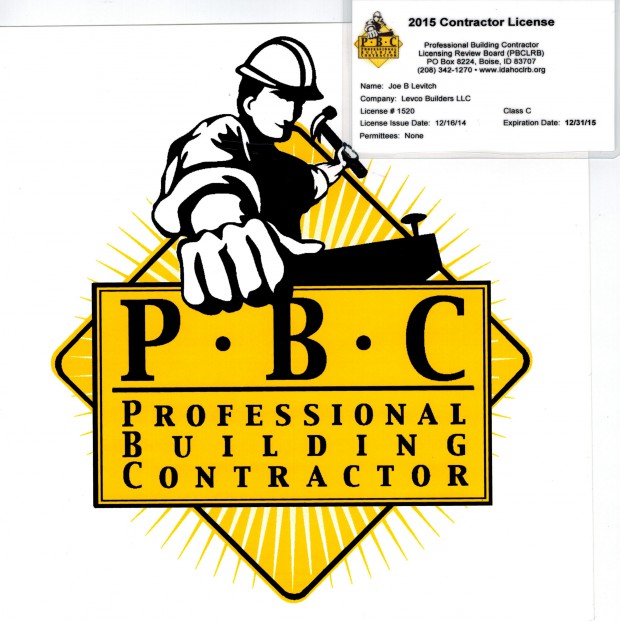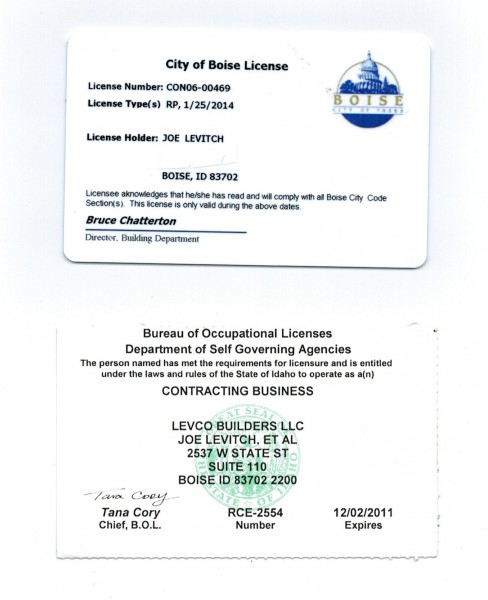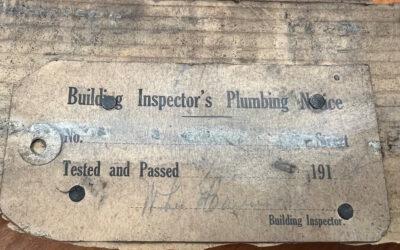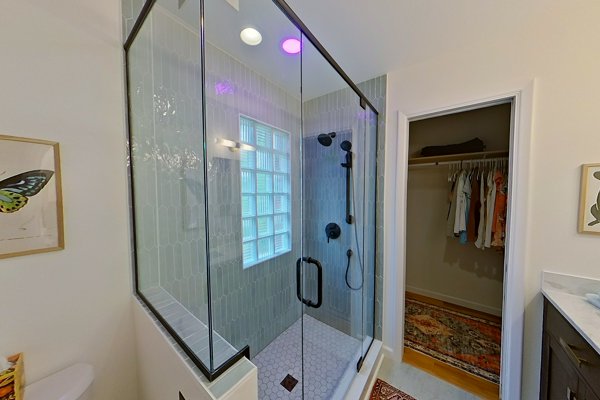For years I have listened to companies advertising/bragging that they are “Licensed and Bonded” as a sign of strength I suppose. Being “bonded” sounds strong and reputable. Truth is, being Licensed & Bonded really means something. Just not here in Idaho in relation to residential remodeling.
Here in Boise Idaho, if you are a residential remodeling contractor, no one is, “Licensed or Bonded” to me, these words are what I like to call “Weasel Words”.
I am licensed by the City as a Responsible Person but that is a separate thing to do with Erosion and Sediment Control for the EPA. I am not really licensed as a contractor nor bonded for remodeling work for that matter.
Here is what I mean. As of January 1, 2006, all Contractors had to become recognized by the State of Idaho. That means we are all registered by the Idaho State Bureau of Occupational Licenses Department of Self Governing Agencies(That is a mouth full) as a Contracting Business. This is just like Barbers, Morticians, Athletic Agents, & Cosmologists, to name a few. Idaho refuses to license remodeling contractors for some inane reason.
If you have work done for you by an un-registered company or person, you are not legally obligated to pay them. Sure there are fees and forms to become registered and it takes an investment in time ($25 annually and about fifteen minutes). However the truth is that we are far from regulated in the way licensing suggests. Most are, some are flying under the radar!
The joke is that all the sub-trades are licensed by the state. Why not remodeling contractors?
There is hope for the future
I want to be the first voluntarily licensed remodeling contractor in the Treasure Valley. There is a voluntary licensing board in Eastern Idaho that is moving west. They have voted me onto their board, and are currently evaluating my application.
Here is what Bonding means. according to answers.com
“A surety bond is a promise to be responsible for the debt, default, or failure of another. In most instances, bonds are required by federal, state, and local governments to protect the taxpayer dollars that are paying for the project. Surety bonds can also act as an element of pre-qualification. By being bonded, a company is saying that they have undergone the examination by a surety and has been qualified to do the project. It is designed to prevent any loss on the part of the obligee, and the pre-qualification process has assessed the financial strength of the principal as well as their expertise. The surety bond company is putting its assets and financial strength behind the contractor. Because of the rigorous pre-qualification, there is little expectation of loss in the surety bond relationship.”
Boiled down, it means that in the event a project couldn’t be completed by the company that was contracted… the bond could be used to hire a different company to finish the project. Bonded companies essentially do work for municipalities where a bond is required.
In asking around, there is no company that provides this service to residential remodelers even if you wanted to buy a bond. I was told that the one bond ever given to a residential project was for an Architect drawing Bill Gates home.
Some companies buy a bond that covers them in the event a client claims that property was stolen by an employee, like house keepers.
If we aren’t licensed or bonded… What are we?
At Levco, we aren’t Licensed per se, or Bonded! Stick that in your pipe & smoke it! I suppose if you want to up the requirements for Contractors, it will take some lobbying of the legislators who are constantly preoccupied with other stuff. I welcome the day when it does happen. Until then we suggest doing your due diligence and checking out your contractor.

Only licensed Remodeling Contractor in Boise
Although we are not licensed in the strict sense of the word, or bonded at all… I do run the business as if we were. Levco is insured as far as liability for 2 million dollars, as well as our personal property and equipment. Knock on wood, we have never had to use it, but it is there none the less. We are also covered for workers compensation (in the event one of our workers gets injured on your job). It would also come into play if say someone that I have hired, that is not insured, gets injured. This is because we withhold the workers comp. from their pay as if we employed them.
If you are looking for a contractor and a company that takes this stuff seriously, and can separate the wheat from the chaff, then Levco is right for you.
On a happy post script, as of 12-16-2014, I am now the first and only licensed remodeling contractor in Boise Idaho! The voluntary program that is alive and well in Eastern Idaho has made its way to Boise. Look for much more on the subject in upcoming posts. Joe









interesting how those 2 terms can mean something totally different, depending on the state in which you reside.
-Jack
After doing more research, there is a form of the word “bonded” that means that you are insured to cover theft of property from a clients home. My electrician says he is “bonded” and that is what he means by it. So yes there are several meanings to the word which confuses the issue. I will add some verbiage to the post to that effect. Thanks for your comment!
Great post. The “bonded” in “licensed and bonded” typically refers to state bonds that assure the contractor will comply with local laws. Unfortunately it has nothing to do with [100%] performance and/or payment bonds. These are sorely needed in the private remodeling industry but contractors are so avoidant of the PG component it’s a non starter for most.
The licensed part pretends to offer homeowners restitution if the contractor goes south / fails to perform but the reality is, the multiple claims that almost always follow a GC collapse dilute any [potential] compensation to a fraction of the contract sum.
In one breath you said great article, In the next you disputed my facts. Which is it? Bonding residential remodeling projects is an interesting idea. I am going to look into that.
Your comment about licensing is way off base however. Licensing has nothing to do with restitution at all, clients are smarter than that around here. Licensing has everything to do with living up to strict standards of practice, verifiable competency, a code of ethics and continuing education.
I looked into your business model in New York and I am not sure what to make of you? On the one hand you profess to be an advocate of the homeowner, in the next for the contractor, You’ve interviewed some disgruntled contractors and one that thinks that having third party verification of their pricing makes the homeowner trust them more….
In my experience price is one of the least things customers are concerned with. What I sell is far more valuable. I sell process, dependability, great communication etc. My goal is to create enthusiastic referrals. I am not selling a commodity.
Not sure I disputed any of your facts. Your assessment of licensing is correct but there is more to it. In NYC and many states across the US the licensing of a contractor also provides the homeowner with the right to make warranty claims. While most states impose implied warranties on contractors for bad workmanship, these implied warranty laws often require that the contractor be licensed in order to apply. Most state contractor boards will not help the homeowner to make a warranty claim against an unlicensed contractor. So if they’re trying to recover at all, they need to go to civil court. Even if they win in civil court, without a bond, there’s a good chance the unlicensed contractor will not be able to pay the damages. The two are linked. As for the restitution funds afforded by bonds, that >$20k allotment usually becomes about $2,000 after a GC collapse / multiple claims. They collectively paid out about $250k last year from some $5.5 billion estimated to be lost from GC failure. So effectively no protection.
Yes, 100%P&P bonding GC ‘s is an interesting idea. My company invented the product for small projects abroad and the US Gov helped me bring it here in 2012. It’s off to a slow start but thats to be expected.
My company is a friend of the remodeling process, that means helping both sides. There is no conflict. There is a lot of disgruntled contractors out there, usually the ones that have been around 20+ years. There is also a massive level of distrust from consumers. Understandable. I do think the best contractors can, and should, win by communicating the value they offer but although you are not “selling a commodity” there is still a fair market value for what you are offering and the absolute dollar amounts involved and the difference between say your bid and the next guys makes hiring you anything but a no brainer to the homeowner. That’s just a problem with the industry: low barrier to entry so “is my contractor really a professional? how do I know/confirm?”, huge knowledge gap, custom spec, custom scope, manufactured product risk, lots of confusing information online, who to trust?
What my company does is analyzes contractor’s individual bids and explains the value they offer to the homeowner. As a result we bring the homeowner up to speed on certain key things and help them get the project they expect at a fair price while helping the contractor avoid a drawn out haggle on price. Our method includes an analysis of the DOW, local pricing data, the schedule, the expected quality grade of material, FF and workmanship, we also look at the contractor’s likelihood to perform (our bond product analyzes their financials in the event our insurance partners need to pay to complete their project but that’s only applicable under our remodeling bond). It’s a new approach that relies upon data science and machine learning and one that I think can bring just the right amount of transparency to the process to the benefit of all parties. It’s also currently a free service while we work out the kinks.
Bottom line, I love remodeling. I was a GC for 10 years, seen my fair share of horror stories, then went on to build and run a national remodeling co that handled both sides of the transaction for a major financial institution. That helped me see further how both parties really behave en masse. I think there is room for huge improvement (not a pun).
btw, why do i need to give my details each time I post?
Dear Fraser, thank you for engaging me in this lively discussion. I can only speak to what is happening in my little area of expertise Boise Idaho. I am experiencing a resurgence in enthusiasm for significant remodeling projects which is wonderful. I understand the the DIY shows profess unrealistic scheduling and pricing information. I am doing everything in my power to separate myself from the “Chuck in a truck” contractors. As I define myself more clearly, the folks that are price shopping are not calling as often. I get that “There is nothing in the world that some man cannot make a little worse and sell a little cheaper, and he who considers price only is that man’s lawful prey.” however it is not an easy concept to teach.
Please do not take this negatively, but there are many ways to accomplish remodeling well without screwing anyone. It is a competitive business that can wear you down. Your system worked for you at some point until it didn’t any more, now you are doing something else. Mine is working well for me right now. My belief is that your niche and product is better suited for those clients want to show the contractor where they are high or “RONG” (spelled that way on purpose). If someone presented me with your product I think that I would run away screaming. I do not see the overlap where your services would be beneficial for me or my clients. If my clients want to compare they can read the link I provide to Remodeling Magazine’s annual cost Vs, value issue.
I resent that you are stating your process and “How “it” should be done” so strongly, because there as many ways to do “it” as there are contractors.
I wish you the best of luck on your entrepreneurial path.